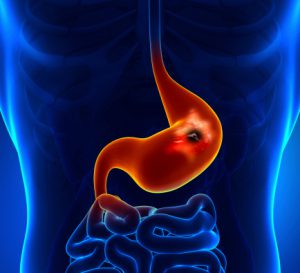Peptic ulcers are open sores that develop in certain parts of your digestive tract. They occur when the protective layer of mucus that lines those areas erodes due to the buildup of acids. If left untreated, these ulcers can lead to internal bleeding and other complications.
There are two types of peptic ulcer disease that are classified based on where they develop. When an ulcer forms on the stomach lining, it is referred to as a gastric ulcer. A duodenal ulcer is the name for an ulcer that appears at the top end of the small intestine. You can have ulcers at any age, but your chances of having one increases with age.
Peptic ulcers generally develop for two reasons:
- Bacteria – One common type of bacteria, known as Helicobacter pylori (or H. pylori) is a main cause for peptic ulcers. While as many as 50% of us carry this type of bacteria, most people infected with H. pylori do not get ulcers. For some however, it can raise the amount of acid produced, break down the protective mucus layer, and irritate the digestive tract.
- Pain Relievers – Another cause for ulcers is prolonged use of pain relievers, such aspirin or medications that contain ibuprofen or naproxen or other nonsteroidal anti-inflammatory drugs (NSAIDs). These medications block your body from making a chemical that help protect the inner walls of your stomach and small intestine from stomach acid.
Smoking cigarettes and drinking alcohol are also contributing factors in the development of ulcers. It is a common misnomer is that stress and spicy foods can a lead to this condition. The fact is that while they are not factors in the formation of ulcers, they can make an existing condition worse.
Some people can have a peptic ulcer and not experience any symptoms. However, if symptoms are present, the most common is a burning pain or discomfort between the naval and breastbone. The pain can last for a few minutes or a few hours, and may come and go for many days or weeks.
Other symptoms may include:
- Bloated feeling
- Burping
- Difficulty breathing
- Lack of appetite or weight loss
- Feeling faint
- Nausea
- Bloody or dark stool
- Vomiting
See a doctor if you experience any of these severe symptoms or if your pain does not go away with over the counter antacids. Your physician can diagnose a peptic ulcer by conducting an endoscopy. During this test, a thin, flexible tube is inserted down your throat and into your stomach and small intestine. The tube has a camera at the end to check the lining for ulcers.
Once confirmed, your doctor can prescribe certain medications designed to help protect the lining of the stomach or small intestine so the ulcer can heal.
To schedule an appointment with a Gastroenterologist at Jamaica Hospital, please call 718-206-7001.
All content of this newsletter is intended for general information purposes only and is not intended or implied to be a substitute for professional medical advice, diagnosis or treatment. Please consult a medical professional before adopting any of the suggestions on this page. You must never disregard professional medical advice or delay seeking medical treatment based upon any content of this newsletter. PROMPTLY CONSULT YOUR PHYSICIAN OR CALL 911 IF YOU BELIEVE YOU HAVE A MEDICAL EMERGENCY.

